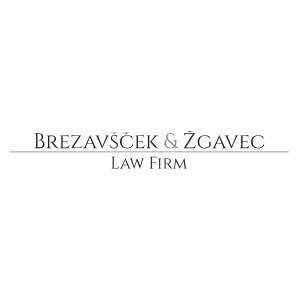Best Structured Finance Lawyers in Slovenia
Share your needs with us, get contacted by law firms.
Free. Takes 2 min.
Or refine your search by selecting a city:
List of the best lawyers in Slovenia
About Structured Finance Law in Slovenia
Structured finance in Slovenia refers to a complex area of finance that involves the pooling of financial assets and the creation of securities backed by these assets. This area of finance is essential for corporations, financial institutions, and investors seeking innovative ways to structure funding, manage risks, and access capital markets. Structured finance includes instruments such as securitizations, collateralized debt obligations, and other asset-backed securities. In Slovenia, the field is shaped by both domestic regulations and European Union directives, ensuring a robust legal framework that aligns with best international practices.
Why You May Need a Lawyer
Structured finance transactions are highly specialized and often involve intricate legal, regulatory, and tax considerations. You may require the assistance of a lawyer in several circumstances, such as:
- Advising on the structuring and documentation of securitization transactions
- Conducting due diligence on assets to be securitized or involved in structured transactions
- Ensuring compliance with Slovenian regulations and EU directives
- Negotiating terms with counterparties and financial institutions
- Representing clients in regulatory filings or communications with the Securities Market Agency (Agencija za trg vrednostnih papirjev)
- Resolving disputes that may arise from complex financial contracts
- Advising investors looking to participate in structured financial products in Slovenia
- Handling cross-border transactions involving Slovenian and foreign entities
Local Laws Overview
Structured finance in Slovenia is governed by a combination of national law and European Union regulations. Important legal aspects include:
- Financial Instruments Market Act (ZTFI-1) - This statute regulates the issuance and trading of financial instruments, including asset-backed securities and securitizations.
- Banking Act (ZBan-3) - Governs the role of banks and financial institutions in structured transactions and risk management practices.
- EU Regulation (EU) 2017/2402 - Applies to securitization transactions, emphasizing transparency, due diligence, and risk retention requirements.
- Slovenian Companies Act - Regulates the formation and operation of special purpose vehicles (SPVs) commonly used in structured finance.
- Regulatory oversight is provided by the Securities Market Agency and the Bank of Slovenia, ensuring compliance and protecting market integrity.
Legal services in this area often require a deep understanding of not only the law but also the commercial and financial aspects of each transaction.
Frequently Asked Questions
What is structured finance?
Structured finance refers to the use of complex financial instruments and strategies to manage risk and customize funding. Common tools include securitizations and asset-backed securities.
Who regulates structured finance activities in Slovenia?
The main regulators are the Securities Market Agency and the Bank of Slovenia, both of which oversee compliance with financial regulations and market practices.
What types of assets can be securitized in Slovenia?
Typical assets include loans, receivables, leases, mortgages, and other financial claims that generate predictable cash flows.
Is foreign investment allowed in Slovenian structured finance transactions?
Yes, foreign investors can participate, provided compliance with local and EU regulations is ensured. Transactions may be subject to additional reporting and transparency requirements.
Do I need special regulatory approval to set up a securitization structure?
Depending on the nature and size of the transaction, regulatory notifications or approvals may be required, particularly when involving public offerings or regulated institutions.
How are structured finance products taxed in Slovenia?
Taxation depends on the type of assets, structure of the transaction, and residence of participants. Tax advisors often work closely with lawyers to optimize transactions.
What are the risks involved in structured finance?
Risks include credit risk, market risk, legal compliance risk, and operational risk. Legal counsel can help identify and mitigate these risks through careful structuring and documentation.
Are there any restrictions on the use of special purpose vehicles?
SPVs must comply with company law and financial regulations. They are commonly used to isolate risk and achieve bankruptcy remoteness, but their activities are closely monitored.
What is “risk retention” and why is it important?
Risk retention rules require parties involved in securitizations to retain a portion of the risk on their balance sheet, promoting responsible lending and reducing systemic risk.
How can I find a suitable lawyer for structured finance in Slovenia?
Look for law firms or practitioners with expertise in finance, capital markets, and cross-border transactions. Recommendations from regulatory agencies or industry associations can also help.
Additional Resources
Several organizations and resources can assist those seeking information or guidance on structured finance in Slovenia:
- Securities Market Agency (Agencija za trg vrednostnih papirjev) - The main supervisory authority for securities and structured finance activities.
- Bank of Slovenia (Banka Slovenije) - Regulates banks and financial institutions, provides guidelines on financial stability.
- Slovenian Bar Association (Odvetniška zbornica Slovenije) - Directory of qualified lawyers specializing in finance and securities law.
- Local Chambers of Commerce and Industry - Offer business support and may have referrals relevant to finance professionals.
- European Banking Authority - Provides information on EU-wide regulations affecting structured finance.
Next Steps
If you are considering a structured finance transaction or face legal questions in this complex field, follow these steps:
- Define your objectives and gather all relevant documentation on your proposed transaction or investment.
- Consult with a lawyer specializing in financial law and structured finance to assess legal viability and risks.
- Ensure compliance with both Slovenian laws and applicable EU regulations.
- Engage professional advisors, such as tax consultants or accountants, as required.
- Stay informed by consulting regulatory agencies and industry associations for updates and guidance.
Structured finance can be highly beneficial but demands careful planning and expert legal support. Taking the appropriate steps now can help secure your interests and ensure regulatory compliance throughout your transaction.
Lawzana helps you find the best lawyers and law firms in Slovenia through a curated and pre-screened list of qualified legal professionals. Our platform offers rankings and detailed profiles of attorneys and law firms, allowing you to compare based on practice areas, including Structured Finance, experience, and client feedback.
Each profile includes a description of the firm's areas of practice, client reviews, team members and partners, year of establishment, spoken languages, office locations, contact information, social media presence, and any published articles or resources. Most firms on our platform speak English and are experienced in both local and international legal matters.
Get a quote from top-rated law firms in Slovenia — quickly, securely, and without unnecessary hassle.
Disclaimer:
The information provided on this page is for general informational purposes only and does not constitute legal advice. While we strive to ensure the accuracy and relevance of the content, legal information may change over time, and interpretations of the law can vary. You should always consult with a qualified legal professional for advice specific to your situation.
We disclaim all liability for actions taken or not taken based on the content of this page. If you believe any information is incorrect or outdated, please contact us, and we will review and update it where appropriate.
Browse structured finance law firms by city in Slovenia
Refine your search by selecting a city.

















